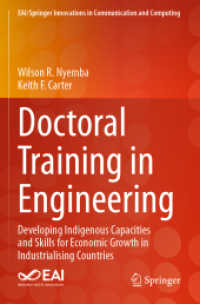- ホーム
- > 洋書
- > 英文書
- > History / World
Full Description
Brazil has long been a country in search of its own meaning and mission. Early in their history Brazilians began to puzzle over their surroundings and their relation to them. The eighteenth century produced an entire school of nativistic writers who, with the advent of independence, became fiery nationalists, still pursuing introspective studies of their homeland. Throughout the nineteenth century, the intellectuals of Brazil determined to define their nation, its character, and its aspirations.
In this now well-established tradition, JosÉ HonÓrio Rodrigues confronts the questions of who and what the Brazilian is, what Brazil stands for, where it has been, and where it is going. This study, originally published in Portuguese as AspiraÇÕes nacionais, was especially timely at a period when strong feelings of nationalism led Brazilians to seek to define their own image, and when the revolution of rising expectations disposed them to determine what goals they were seeking and how far they were on the road to achieving them.
In order to understand and explain his nation, Rodrigues poses two questions: what are the national characteristics, and what are the national aspirations? Both questions are complex, but the reader will find well-reasoned answers, with a wealth of information on growth and development and abundant statistics to substantiate these answers.
Contents
Foreword by E. Bradford Burns
Preface
Introduction: Political Psychology and the Brazilians
1. National Characteristics
2. National Aspirations and Political Parties
3. Personalities and Power
Part I. National Characteristics
4. National Characteristics
5. Brazil as Seen by Foreigners
6. General Traditions and Present-Day Characteristics
7. Traditional Positive Characteristics
8. Present-Day Positive Characteristics
9. Traditional and Present-Day Negative Characteristics
10. Conclusion
Part II: National Aspirations
11. Introduction
12. Independence and Sovereignty
13. Territorial Integrity
14. Effective Occupation of the Land
15. National Unity
16. National Equilibrium and Regionalism
17. Communications and National Unity
18. Psychosocial Integration
19. Miscegnation and Racial Tolerance
20. Acculturation and Nationalization of Immigrants
21. Classes and Social Justice
22. Representative Government and Harmonious Division of Powers
23. Oligarchy and Democracy
24. Centralization and Federation
25. Economic Development and Well-Being
26. Education
27. Health
Part III: The Permanent and the Transitory: A Summing Up
28. The Permanent and the Transitory: A Summing Up
Bibliography
Index








